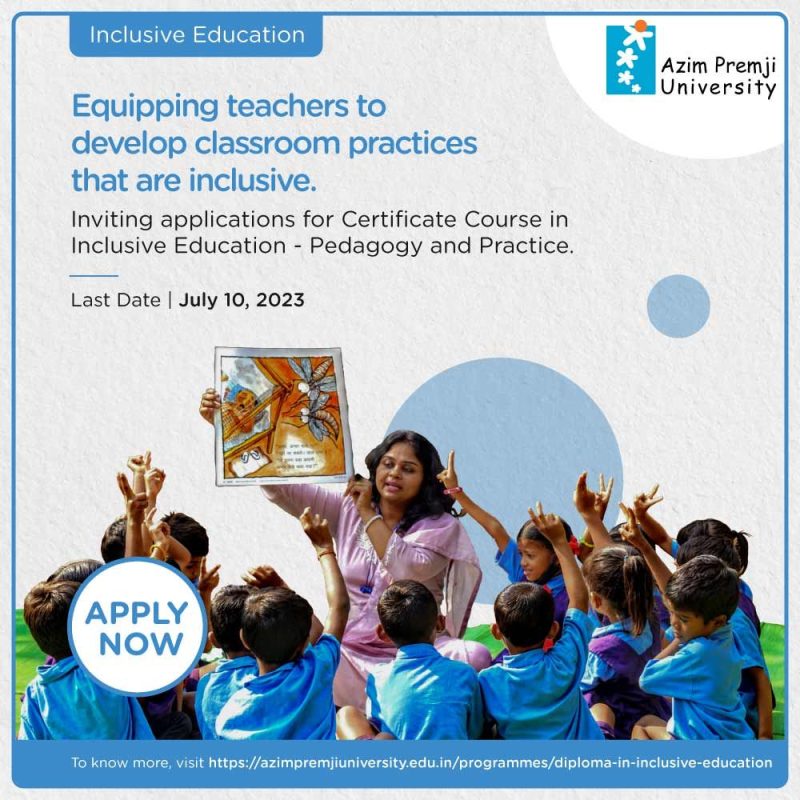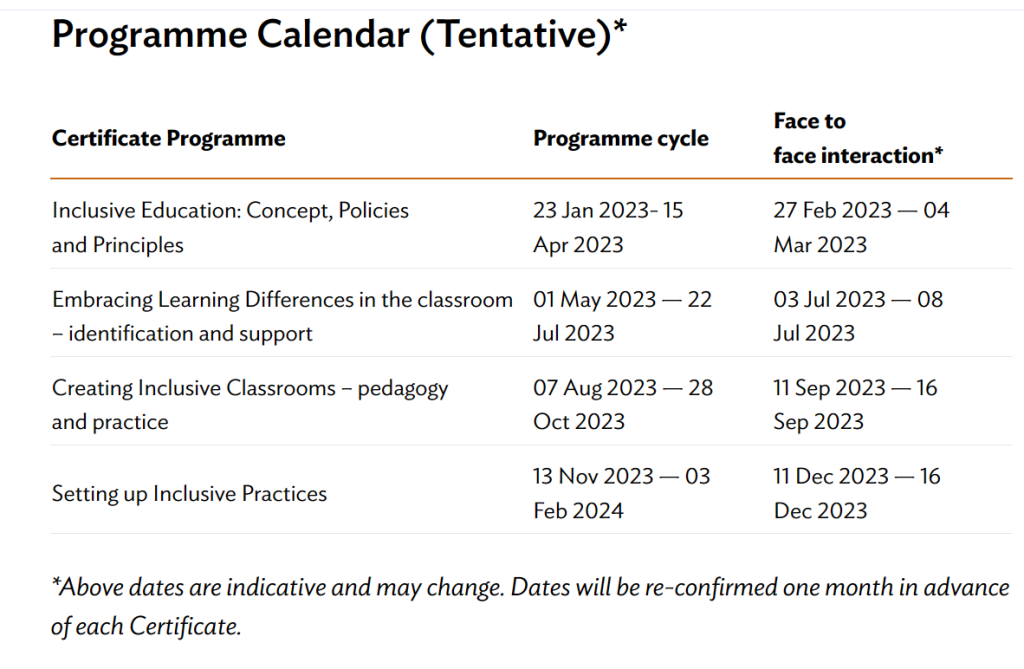Diploma in Inclusive Education – Azim Premji University

![]()
Apply by 10th July 23
Azim Premji University was established under the Azim Premji University Act 2010 of the Government of Karnataka. Azim Premji Foundation, the sponsoring body set up the University as a fully philanthropic and not-for-profit entity, with a clear social purpose. The University started in 2011 and since then have admitted over 2000 students.
Working with children with diverse learning needs in the classroom.
DURATION 1 year part-time
Introduction
There are children with different learning needs in every classroom. Children with disabilities educated in regular schools outperform those educated in segregated settings. An inclusive school environment benefits all children, not just those with disabilities.
The National Education Policy (NEP) of India proposes full participation of children with diverse learning needs in the regular schooling process.
Teachers in regular classrooms need to develop capabilities to cater to the diverse learning needs of children in their classrooms.
The aim of the Diploma Programme in Inclusive Education is to develop capabilities of teachers and educators in the regular school system for working with children with diverse learning needs to maximise their learning potential.
This programme will be offered in collaboration with Spastics Society of Karnataka, and Ummeed Child Development Center.
Spastics Society of Karnataka is a non-governmental organisation that has done 15 years and more of dedicated service towards conducting various pre-service and in-service teacher training programmes for inclusive education, autism spectrum disorder, learning disability, early childhood education, and cerebral palsy.
Ummeed Child Development Center is a not-for-profit organisation with a vision of helping children with developmental disabilities reach their full potential to be included in society. In nineteen years, with a transdisciplinary team of developmental paediatricians, occupational therapists, mental health professionals, autism intervention specialists, special educators, speech therapists and social workers have directly worked with over 10,000 children and their families, providing support through over 75,000 sessions.
The Diploma in Inclusive Education provides regular school teachers with the knowledge about inclusive education as a concept and practice, and equips them with skills needed to identify and work with children with diverse learning needs in regular classrooms. Through extensive hands on exercises and evidence based practices, teachers will learn how to modify curriculum, teaching practices and assessment to suit individual learning needs of children in their classrooms, and to practice inclusion in their own settings.
The diploma programme will be beneficial to all Teachers in the primary and middle school, and to Educators in administrative roles such as school heads, Principals, Special Educators, and Counsellors belonging to the public and private school systems.
Key features of the programme
- Provide regular school teachers with an understanding about inclusion, current policy provisions, and the benefits and barriers of inclusive education in the Indian school system.
- Prepare teachers with skills to identify and support diversity in the classroom.
- Equip teachers with capabilities to modify the curriculum, instruction, pedagogy and assessment to support the needs of children with learning difficulties in regular classrooms.
- Provide teachers and educators with knowledge and skills to set up inclusive practices in their own contexts.
The programme is open for teachers, Educators, Principals, Special Educators and Counsellors from public and private school with minimum 2 years of relevant work experience. The eligibility criteria are:
- Undergraduate in any discipline (Preferred)
- Working knowledge of English (reading, writing, and speaking)
Application process and fees
Application process
Step 1 : Online application form with statement of purpose
Step 2 : Personal Interview conducted online
Fees
DIPLOMA PROGRAMME
The total fees are INR 35,400 (including GST)
Before commencement of first certificate programme: INR 17,700
Before commencement of third certificate programme: INR 17,700
CERTIFICATE PROGRAMME
The total fees are INR 10,030 (including GST)
Before the commencement of the programme: INR 10, 030* (including GST)
*No refund
Note: GST rates are in line with Government guidelines and are subject to change.
Contact us
Address: Azim Premji University, Survey No. 66, Burugunte Village, Bikkanahalli Main Road, Sarjapura, Bengaluru — 562125.
E‑mail: admission.diploma@apu.edu.in
Mobile: 8951978091

Course structure
The 24 credits, 12 months Diploma programme is offered in a blended mode, with online and on-campus interaction.
The Diploma programme comprises four certificate programmes (12 weeks duration, 6 credits each) covering key aspects of Inclusive Education.
Participants have the flexibility of joining the diploma programme or taking one or more certificate programmes
- Successful completion of the four certificate programmes leads to award of the Diploma. The Diploma can be completed with a maximum time period of 2 years.
- The on campus components will be held at Azim Premji University, Bengaluru.
Pedagogy
The programme will be offered in blended mode:
- Online — This will be conducted through lectures, group work, workshops, presentations, readings, participation in discussion forums on Learning Management Systems, audio/video material and regular assessment.
- Face to face interaction — Each of the four certificates of the diploma programme has a face-to-face component that involves one week on-campus engagement, providing opportunities for sharing of learning through intensive group work and interaction with experts and practitioners from the field.
- Registering for individual certificate programmes, would entail mandatory attendance in the face-to-face component for the respective certificate.
- Registering for the entire diploma programme would entail mandatory attendance in the face-to-face component in minimum of the two certificate programmes. The participant will have the flexibility of choosing to attend the face-to-face session or completing a project for the remaining two certificate programmes.
- Course 1: Inclusive Education- Introduction (3 Credits)
- Course 2: Inclusive Education- Policies and Principles (3 Credits)
- Course 1: Learning Differences in the Classroom (3 Credits)
- Course 2: Speech and Communication Disorder, Autism Spectrum Disorder, Locomotor and Intellectual Disability (3 Credits)
- Course 1: Differentiated assessment and IEP (3 Credits)
- Course 2: Differentiated teaching and learning (3 Credits)
- Course 1: Leadership and School Culture (3 Credits)
- Course 2: Multi-tiered support; Family and community engagement (3 Credits)
Total 24 credits

